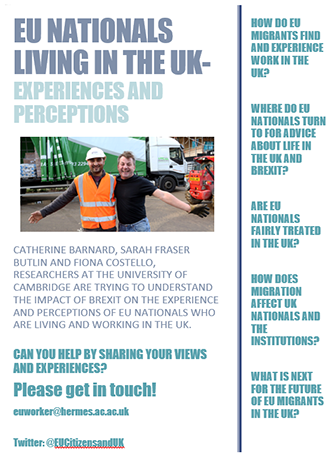 Context
Context
The issue of migration continues to be central in debates regarding the UK’s future relationship with the EU. Brexit will necessitate a complete overhaul of the current system on free movement of people, with the UK setting its own immigration policy. Following the referendum decision in favour of Brexit, then Prime Minister, Theresa May, set out in a White Paper 12 principles that will guide the Government in 'fulfilling the democratic will of the people of the UK'. Among those principles was a promise to 'control immigration', motivated by concerns 'about pressure on public services, like schools and our infrastructure, especially housing' as well as what was described as the 'downward pressure [placed] on wages for people on the lowest incomes' because of the 'sheer volume' of immigration. The first stage in this process is the rolling out of the Pre-Settled and Settled Status scheme launched by the Government in 2019 to which 1.3 million EU nationals living in the UK have applied to date (August 2019).
Our Work
We have secured funding from the ESRC for a 36-month project to look at the impact of Brexit on the experience of living and working as an EU migrant in the UK. Our aim is to chart the experience and perceptions of EU migrants in the UK before, during and after Brexit to enable us to analyse issues facing EU migrants in seeking access to the social welfare system in the UK, the issues they have with immigration law and employment law, specifically the relationship between race and nationality discrimination and the Brexit process. We will seek to collect robust empirical evidence to establish whether the fact of Brexit, together with the policy changes, media pronouncements and political rhetoric, have an impact on both the experience of, and perceptions surrounding, the experience of EU migrants.
Our research project will examine:
- Law: migrants in the UK on Brexit day will be entitled to apply for ‘Settled’ or ‘Pre-settled’ status. The research will look at how this system is working in practice? What are the problems involved? Is it a scheme which could be rolled out for new migrants arriving post Brexit? How will it fit with any arrangements under a future deal (if any)?
- Practice: it will examine the sorts of problems EU migrants are experiencing. Do their problems change over time? And how are these problems resolved if at all.
- Experience: the research will look at the extent to which migrants are experiencing discrimination, especially in terms of race (race, in the UK, includes nationality discrimination) and to what extent are they affected by the race pay gap? Has Brexit increased the prevalence of race discrimination and specifically, the number and kind of claims brought? Has it affected how non-EU migrants are viewed, even those British workers but from a BME background?
We will be interviewing migrant workers and spending time with organisations that work with migrant workers and businesses that employ them. We will also be holding focus groups and discussion events. We hope to be able to follow a small group of specialised migrant advice agencies across the country and document on film their experiences of navigating new systems and supporting clients in a pre, during and post Brexit world.
By combining this insight with knowledge about the law in this field, we hope to shed new light on the big question of the impact of Brexit on a local, regional and national level. We hope that this research project will help to inform public debate as we reconceive and renegotiate the UK's relationship with the EU.
